- Home
- Jack London
Michael, Brother of Jerry Page 3
Michael, Brother of Jerry Read online
Page 3
CHAPTER II
Dag Daughtry strolled along the beach, Michael at his heels or runningcircles of delight around him at every repetition of that strange low lip-noise, and paused just outside the circle of lantern light where duskyforms laboured with landing cargo from the whaleboats and where theCommissioner's clerk and the _Makambo's_ super-cargo still wrangled overthe bill of lading. When Michael would have gone forward, the manwithstrained him with the same inarticulate, almost inaudible kiss.
For Daughtry did not care to be seen on such dog-stealing enterprises andwas planning how to get on board the steamer unobserved. He edged aroundoutside the lantern shine and went on along the beach to the nativevillage. As he had foreseen, all the able-bodied men were down at theboat-landing working cargo. The grass houses seemed lifeless, but atlast, from one of them, came a challenge in the querulous, high-pitchedtones of age:
"What name?"
"Me walk about plenty too much," he replied in the beche-de-mer Englishof the west South Pacific. "Me belong along steamer. Suppose 'm youtake 'm me along canoe, washee-washee, me give 'm you fella boy two sticktobacco."
"Suppose 'm you give 'm me ten stick, all right along me," came thereply.
"Me give 'm five stick," the six-quart steward bargained. "Suppose 'myou no like 'm five stick then you fella boy go to hell close up."
There was a silence.
"You like 'm five stick?" Daughtry insisted of the dark interior.
"Me like 'm," the darkness answered, and through the darkness the bodythat owned the voice approached with such strange sounds that the stewardlighted a match to see.
A blear-eyed ancient stood before him, balancing on a single crutch. Hiseyes were half-filmed over by a growth of morbid membrane, and what wasnot yet covered shone red and irritated. His hair was mangy, standingout in isolated patches of wispy grey. His skin was scarred and wrinkledand mottled, and in colour was a purplish blue surfaced with a greycoating that might have been painted there had it not indubitably grownthere and been part and parcel of him.
A blighted leper--was Daughtry's thought as his quick eyes leapt fromhands to feet in quest of missing toe- and finger-joints. But in thoseitems the ancient was intact, although one leg ceased midway between kneeand thigh.
"My word! What place stop 'm that fella leg?" quoth Daughtry, pointingto the space which the member would have occupied had it not been absent.
"Big fella shark-fish, that fella leg stop 'm along him," the ancientgrinned, exposing a horrible aperture of toothlessness for a mouth.
"Me old fella boy too much," the one-legged Methuselah quavered. "Longtime too much no smoke 'm tobacco. Suppose 'm you big fella whitemarster give 'm me one fella stick, close up me washee-washee you thatfella steamer."
"Suppose 'm me no give?" the steward impatiently temporized.
For reply, the old man half-turned, and, on his crutch, swinging hisstump of leg in the air, began sidling hippity-hop into the grass hut.
"All right," Daughtry cried hastily. "Me give 'm you smoke 'm quickfella."
He dipped into a side coat-pocket for the mintage of the Solomons andstripped off a stick from the handful of pressed sticks. The old man wastransfigured as he reached avidly for the stick and received it. Heuttered little crooning noises, alternating with sharp cries akin topain, half-ecstatic, half-petulant, as he drew a black clay pipe from ahole in his ear-lobe, and into the bowl of it, with trembling fingers,untwisted and crumbled the cheap leaf of spoiled Virginia crop.
Pressing down the contents of the full bowl with his thumb, he suddenlyplumped upon the ground, the crutch beside him, the one limb under him sothat he had the seeming of a legless torso. From a small bag of twistedcoconut hanging from his neck upon his withered and sunken chest, he drewout flint and steel and tinder, and, even while the impatient steward wasproffering him a box of matches, struck a spark, caught it in the tinder,blew it into strength and quantity, and lighted his pipe from it.
With the first full puff of the smoke he gave over his moans and yelps,the agitation began to fade out of him, and Daughtry, appreciativelywaiting, saw the trembling go out of his hands, the pendulouslip-quivering cease, the saliva stop flowing from the corners of hismouth, and placidity come into the fiery remnants of his eyes.
What the old man visioned in the silence that fell, Daughtry did not tryto guess. He was too occupied with his own vision, and vividly burnedbefore him the sordid barrenness of a poor-house ward, where an ancient,very like what he himself would become, maundered and gibbered anddrooled for a crumb of tobacco for his old clay pipe, and where, of allhorrors, no sip of beer ever obtained, much less six quarts of it.
And Michael, by the dim glows of the pipe surveying the scene of the twoold men, one squatted in the dark, the other standing, knew naught of thetragedy of age, and was only aware, and overwhelmingly aware, of theimmense likableness of this two-legged white god, who, with fingers ofmagic, through ear-roots and tail-roots and spinal column, had won to theheart of him.
The clay pipe smoked utterly out, the old black, by aid of the crutch,with amazing celerity raised himself upstanding on his one leg andhobbled, with his hippity-hop, to the beach. Daughtry was compelled tolend his strength to the hauling down from the sand into the water of thetiny canoe. It was a dug-out, as ancient and dilapidated as its owner,and, in order to get into it without capsizing, Daughtry wet one leg tothe ankle and the other leg to the knee. The old man contorted himselfaboard, rolling his body across the gunwale so quickly, that, even whileit started to capsize, his weight was across the danger-point andcounterbalancing the canoe to its proper equilibrium.
Michael remained on the beach, waiting invitation, his mind not quitemade up, but so nearly so that all that was required was that lip-noise.Dag Daughtry made the lip-noise so low that the old man did not hear, andMichael, springing clear from sand to canoe, was on board without wettinghis feet. Using Daughtry's shoulder for a stepping-place, he passed overhim and down into the bottom of the canoe. Daughtry kissed with his lipsagain, and Michael turned around so as to face him, sat down, and restedhis head on the steward's knees.
"I reckon I can take my affydavy on a stack of Bibles that the dog justup an' followed me," he grinned in Michael's ear.
"Washee-washee quick fella," he commanded.
The ancient obediently dipped his paddle and started pottering an erraticcourse in the general direction of the cluster of lights that marked the_Makambo_. But he was too feeble, panting and wheezing continually fromthe exertion and pausing to rest off strokes between strokes. Thesteward impatiently took the paddle away from him and bent to the work.
Half-way to the steamer the ancient ceased wheezing and spoke, noddinghis head at Michael.
"That fella dog he belong big white marster along schooner . . . You give'm me ten stick tobacco," he added after due pause to let the informationsink in.
"I give 'm you bang alongside head," Daughtry assured him cheerfully."White marster along schooner plenty friend along me too much. Just nowhe stop 'm along _Makambo_. Me take 'm dog along him along _Makambo_."
There was no further conversation from the ancient, and though he livedlong years after, he never mentioned the midnight passenger in the canoewho carried Michael away with him. When he saw and heard the confusionand uproar on the beach later that night when Captain Kellar turnedTulagi upside-down in his search for Michael, the old one-legged oneremained discreetly silent. Who was he to seek trouble with the strangeones, the white masters who came and went and roved and ruled?
In this the ancient was in nowise unlike the rest of his dark-skinnedMelanesian race. The whites were possessed of unguessed and unthinkableways and purposes. They constituted another world and were as a play ofsuperior beings on an exalted stage where was no reality such as blackmen might know as reality, where, like the phantoms of a dream, the whitemen moved and were as shadows cast upon the vast and mysterious curtainof the Cosmos.
The gang-plank bein
g on the port side, Dag Daughtry paddled around to thestarboard and brought the canoe to a stop under a certain open port.
"Kwaque!" he called softly, once, and twice.
At the second call the light of the port was obscured apparently by ahead that piped down in a thin squeak.
"Me stop 'm, marster."
"One fella dog stop 'm along you," the steward whispered up. "Keep 'mdoor shut. You wait along me. Stand by! Now!"
With a quick catch and lift, he passed Michael up and into unseen handsoutstretched from the iron wall of the ship, and paddled ahead to an opencargo port. Dipping into his tobacco pocket, he thrust a loose handfulof sticks into the ancient's hand and shoved the canoe adrift with nothought of how its helpless occupant would ever reach shore.
The old man did not touch the paddle, and he was unregardless of thelofty-sided steamer as the canoe slipped down the length of it into thedarkness astern. He was too occupied in counting the wealth of tobaccoshowered upon him. No easy task, his counting. Five was the limit ofhis numerals. When he had counted five, he began over again and counteda second five. Three fives he found in all, and two sticks over; andthus, at the end of it, he possessed as definite a knowledge of thenumber of sticks as would be possessed by the average white man by meansof the single number _seventeen_.
More it was, far more, than his avarice had demanded. Yet he wasunsurprised. Nothing white men did could surprise. Had it been twosticks instead of seventeen, he would have been equally unsurprised.Since all acts of white men were surprises, the only surprise of actionthey could achieve for a black man would be the doing of an unsurprisingthing.
Paddling, wheezing, resting, oblivious of the shadow-world of the whitemen, knowing only the reality of Tulagi Mountain cutting its crest-lineblackly across the dim radiance of the star-sprinkled sky, the reality ofthe sea and of the canoe he so feebly urged across it, and the reality ofhis fading strength and of the death into which he would surely end, theancient black man slowly made his shoreward way.

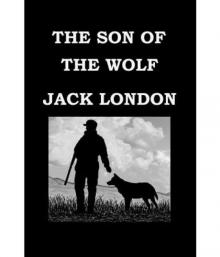 The Son of the Wolf
The Son of the Wolf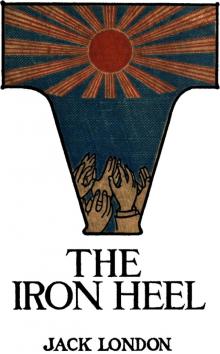 The Iron Heel
The Iron Heel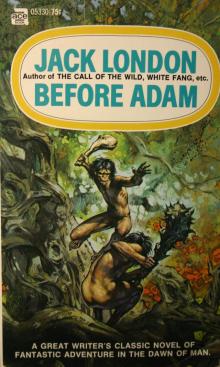 Before Adam
Before Adam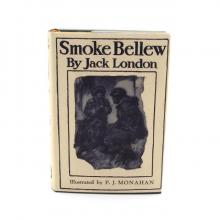 Smoke Bellew
Smoke Bellew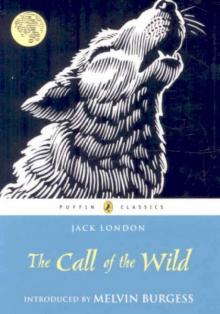 The Call of the Wild
The Call of the Wild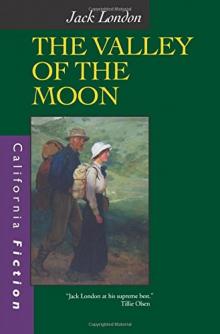 The Valley of the Moon Jack London
The Valley of the Moon Jack London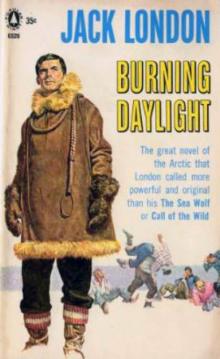 Burning Daylight
Burning Daylight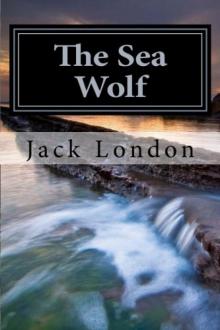 The Sea Wolf
The Sea Wolf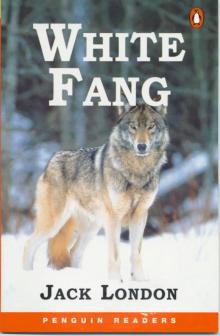 White Fang
White Fang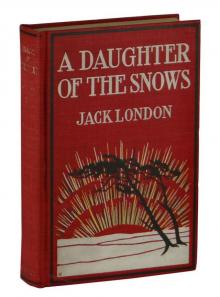 A Daughter of the Snows
A Daughter of the Snows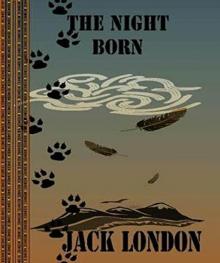 The Night-Born
The Night-Born A Son Of The Sun
A Son Of The Sun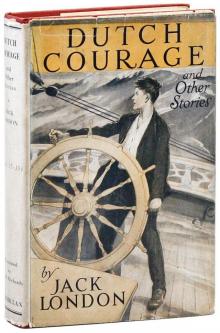 Dutch Courage and Other Stories
Dutch Courage and Other Stories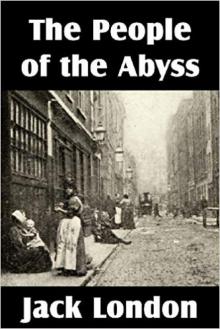 The People of the Abyss
The People of the Abyss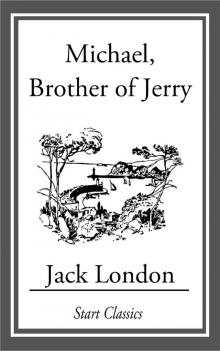 Michael, Brother of Jerry
Michael, Brother of Jerry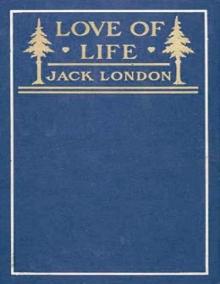 Love of Life, and Other Stories
Love of Life, and Other Stories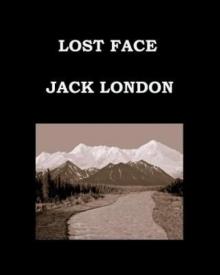 Lost Face
Lost Face The Road
The Road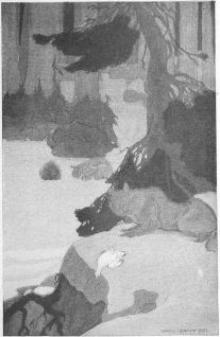 Love of Life
Love of Life The Turtles of Tasman
The Turtles of Tasman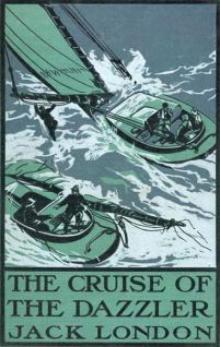 The Cruise of The Dazzler
The Cruise of The Dazzler The Heathen
The Heathen The Scab
The Scab The Faith of Men
The Faith of Men Adventure
Adventure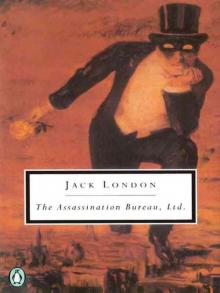 The Assassination Bureau, Ltd.
The Assassination Bureau, Ltd.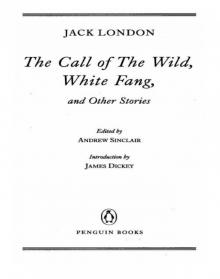 The Call of the Wild, White Fang, and Other Stories
The Call of the Wild, White Fang, and Other Stories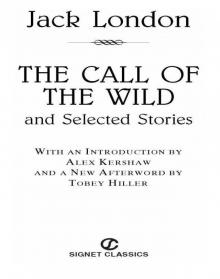 The Call of the Wild and Selected Stories
The Call of the Wild and Selected Stories Jerry of the Islands
Jerry of the Islands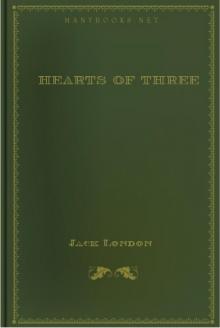 Hearts of Three
Hearts of Three The House of Pride
The House of Pride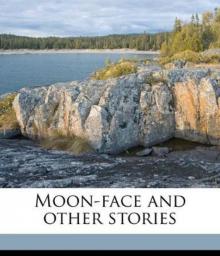 Moon-Face and Other Stories
Moon-Face and Other Stories Children of the Frost
Children of the Frost South Sea Tales
South Sea Tales The Strength of the Strong
The Strength of the Strong The Jacket (The Star-Rover)
The Jacket (The Star-Rover) The Little Lady of the Big House
The Little Lady of the Big House John Barleycorn
John Barleycorn ADaugter of Snows
ADaugter of Snows The Mutiny of the Elsinore
The Mutiny of the Elsinore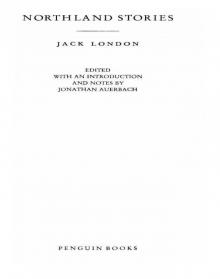 Northland Stories
Northland Stories Tales of the Fish Patrol
Tales of the Fish Patrol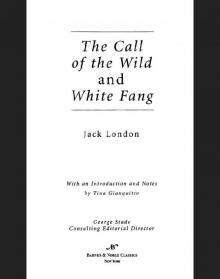 Call of the Wild and White Fang (Barnes & Noble Classics Series)
Call of the Wild and White Fang (Barnes & Noble Classics Series) The Valley of the Moon
The Valley of the Moon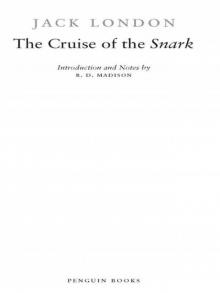 The Cruise of the Snark
The Cruise of the Snark The Game
The Game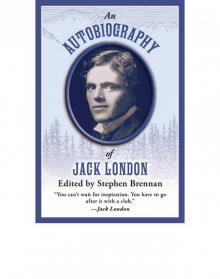 An Autobiography of Jack London
An Autobiography of Jack London